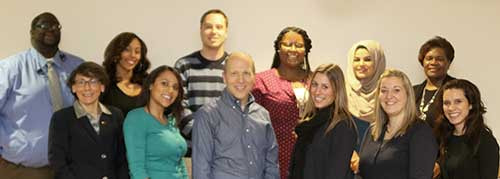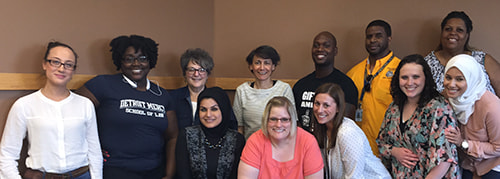CUSP-CAY Fellowship

As part of the White House's Now is the Time initiative (begun under the Obama administration), University of Detroit Mercy's Counseling program was awarded more than $2.5M by the Health Services and Resources Administration (HRSA) to expand the behavioral health workforce serving individuals in greatest need. Funded by the Health Resources and Services Administration (HRSA), Detroit Mercy's Working with At-Risk Youth (WARY) Fellowship program was implemented from 2014-2018 while a second award was made for implementation of the Counseling Underserved Populations (CUSP) Fellowship program from 2017 - 2022 and the Counseling Underserved Populations - Children, Adolescents and Young Adults (CUSP-CAY) Fellowship, 2023 - 2025. The WARY Fellowship program was designed specifically to train Master's-level counselors to work with high risk adolescents and the CUSP Fellowship program expanded to emphasize the clinical treatment of high risk individuals across the lifespan and particularly, those in medically underserved communities. The CUSP-CAY Fellowship at Detroit Mercy integrates both of these focusing primarily on the most vulnerable young persons and treating those in face to face settings. As a result of these three pivotal Fellowship programs, the Detroit Mercy Counseling program continues to expand the behavioral health workforce and address the needs of the most vulnerable individuals with 140 Fellows, and counting.
Program Description
With a particular emphasis on treating highly marginalized individuals including those with complex needs, involved in public systems (child welfare, criminal justice, mental health), in residential settings, the CUSP -CAY Fellowship program provides enhanced academic coursework, preparation, and experiential training to participating Counseling students. CUSP-CAY Fellows receive advanced training and preparation at no cost as well as a $15,000 stipend for program participation and an early career commitment to treating individuals in greatest need.
CUSP-CAY Advanced Training Curriculum
The CUSP-CAY curriculum includes four courses that are completed during the Fellow's final year of the Counseling program. Coursework includes:
Counseling Vulnerable Individuals: Advanced Preparation and Practice
An advanced semester-long course emphasizing the treatment of young people with complex needs, and specifically those related to system-involvement, poverty, geography, and ethnicity. In addition, the course provides advanced preparation in trauma treatment and addiction, as well as a deep, developmentally-informed examination of the myriad issues affecting individuals living in poverty.
CUSP-CAY Lessons from Leaders Seminar & Mentoring Series
The seminar series provides an opportunity for Fellows to learn directly from seasoned community-based leaders and practitioners who specialize in treating vulnerable individuals in behavioral and primary health. In addition, leaders from the public systems of mental health, juvenile justice, and child welfare are highlighted, as well as those from the addiction field and K-12 schools.
Participants
In order to be eligible for a CUSP-CAY Fellowship, students must:
- Be currently enrolled in University of Detroit Mercy's master's programs in Counseling, in Clinical Mental Health, Addiction or School Counseling;
- Maintain a 3.0 GPA throughout the Counseling program;
- Maintain 90 percent or better attendance in the Counseling program; and
- Have U.S. citizenship, be a non-citizen national of the United States, or have been lawfully admitted for permanent residence at the time of award.
Financial Information
CUSP-CAY Fellows participate in all of the CUSP-CAY enhanced coursework free of charge and receive a stipend of $15,000 for completion of the Fellowship, including completion of the specialized internship.
Authorized Fellowship Sites
Currently, there are several authorized internship sites that include but are not limited to:
- Affirmations
- Ascension Health
- Berkley Public Schools
- Black Family Development, Inc.
- Brighton Hospital
- Chippewa Valley High School
- Counseling & Psychological Services, Wayne State University
- Detroit Public Schools
- Development Centers, Inc.
- Easter Seals
- Hamtramck Public Schools
- Harbor Oaks Hospital
- Mariners Inn
- Meridian Health
- New Oakland Mental Health
- Oakland Family Services
- St. Mary's Hospital
- The Guidance Center
- Ypsilanti Community Schools
-
2024-25 CUSP-CAY Fellows
- Soyoung Lee
- Becky Kraft
- Katelyn Augugliaro
- Krystal Macon-Adams
- Christian Green
- Lalisha Griffin
- Laurel Johnson
- Kristin Impastato
- Leslie King
- April Lark
- Tyronda Murray
- Alyssa White
- Angela Lentine
- Tatiana Vega
- Michael Collins
-
2023-24 CUSP-CAY Fellows
- Tiffany Alvord
- Cierra Coward
- Clara Dumas
- Daviale Gandy
- Ashley Hursin
- Davinder Kaur
- Timothy Martin
- Wendy Nichols
- Michelle Pryor
- Cham Smadi
- Kimberly Sorrell-Hall
- Ilene Soto
- Zunaira Tirmizi
- Matthew Worpell
-
2020-22 CUSP Fellows
- Ashley Adams
- Mona Baydoun
- Reyma Bazzi
- Tina Cardamone
- Kezzi Chudler
- AlexSaundra Clark
- Brandy Edmonds
- Samantha Fair
- Susie Garrett
- Steven Hall
- Maureen Horan
- Nicole Hoxsey
- Bria Hutchins
- Liliana Ismail
- Christopher Jordan
- Dymin Mahone
- Olivia Maleckas
- Amanda Martin
- Jessica McKillop
- Camilla Ndojac
- Stacy Rucinski
- May Sabah
- Damaris Smith
- Chelsi Steen
- Damya Toney
- Baron Warren
- Malaika Williams
- Quanda Young
-
2019-20 CUSP Fellows
- Lara Elia
- Juantonia Hill
- Nicholas Olsen
- Marla Moss
- Shauni Ford
- Alex Belanger
- Hailey Joppich
-
2018-19 CUSP Fellows
- Audra Adu
- Victoria Akinboboye
- Allison Cumper
- Elisabeth Formica
- Diamond Johnson
- Amber Kilanowski
- Emerie Loomis
- Kathryn Marburger
- Anna Orletski
- LaTesha Powell
- Karen Sherman
- Gabriell Wardlaw-Pfaff
-
2017-18 CUSP Fellows
- Matthew Cavins
- Brittany Harris
- Ja'Keya Kellom
- Sherry Miller
- Kevin Parrish
- Tiffany Ruff
- Bethany Schindler
- LaTasha Spencer
- Namer Zayouna
-
2016-17 WARY Fellows
- Kristen Albright
- Rusmira Bektas
- Analena Iacobelli
- Chioke Bracy
- Aisha Cunningham
- Elizabeth Curtis
- Ashley Grimes
- Taliah Williams-Hunter
- Robert Kaiser
- Dayna Kanouna
- Audrey Kary
- Heather Kohl
- Kelly Maveal
- Joy Montgomery
- Timothy Ossman
- Eva Qerama
- Jennifer Villarreal
- Megan Waterbury
- LynShannon Williams
- Tanesha Windom
-
2015-16 WARY Fellows

- Christina Arsenault
- Cortney Ball
- Jessica Elezaj
- Thomas Grden
- Timothy Mann
- Michelle Marshbanks
- Rema Mourad
- Peter Petroske
- Jennifer Schilling
- John Simmons
-
2014-15 WARY Fellows

- Layla Almaliky
- Molly Belill-Biondo
- Marques Blanford
- Kylie Chaffin
- Shimika Chillous
- Ann Dadah
- Brandon Johnson
- Tearah Kemp
- Tracy Manigold
- Andrea Maxwell
- Robert Oden
- Shaaree Presley
- India Schumake
- Randa Shakra
